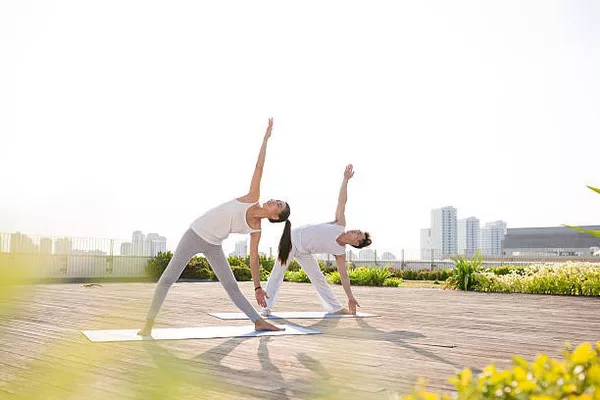Gentle Flow Yoga is a type of yoga that emphasizes slow, smooth movements and a calming practice. Unlike more vigorous forms of yoga, Gentle Flow Yoga focuses on relaxation, flexibility, and mindfulness. This style of yoga is ideal for beginners, those recovering from injuries, or anyone looking to reduce stress and improve overall well-being.
Understanding Gentle Flow Yoga
Definition and Principles
Gentle Flow Yoga combines elements of traditional yoga with a slower pace and more accessible postures. The primary goal is to enhance physical and mental well-being through gentle, flowing movements. This style of yoga is designed to:
- Promote relaxation and reduce stress
- Improve flexibility and range of motion
- Increase strength and stability
- Encourage mindfulness and mental clarity
Key Components
Breathing Techniques: Gentle Flow Yoga incorporates deep, mindful breathing to help synchronize movement and breath. This can enhance relaxation and focus.
Flowing Movements: Postures are linked together in a smooth, continuous flow, which helps maintain a sense of calm and fluidity throughout the practice.
Gentle Postures: Poses are often modified to accommodate different levels of flexibility and strength. The emphasis is on comfort and ease rather than intensity.
Benefits of Gentle Flow Yoga
Physical Benefits
Improved Flexibility: Regular practice can help increase your flexibility and range of motion, making everyday movements easier and more comfortable.
Enhanced Strength: While not as intense as other forms of yoga, Gentle Flow Yoga still engages and strengthens various muscle groups.
Better Posture: The focus on alignment and body awareness can help improve your posture and reduce discomfort associated with poor alignment.
Mental and Emotional Benefits
Stress Reduction: The calming nature of Gentle Flow Yoga helps activate the parasympathetic nervous system, reducing stress and promoting relaxation.
Increased Mindfulness: The practice encourages mindfulness and present-moment awareness, which can improve mental clarity and emotional resilience.
Enhanced Sleep Quality: Regular practice may contribute to better sleep by reducing stress and promoting relaxation.
Weight Loss Potential
While Gentle Flow Yoga is not a high-intensity workout, it can still support weight loss and overall fitness goals. By improving flexibility, strength, and stress management, this practice can complement a balanced fitness routine and healthy lifestyle.
How to Get Started with Gentle Flow Yoga
Finding a Class
Local Studios: Many yoga studios offer Gentle Flow Yoga classes. Look for classes labeled as “gentle,” “slow flow,” or “restorative.”
Online Resources: Numerous online platforms provide Gentle Flow Yoga classes and tutorials. This can be a convenient option if you prefer practicing at home.
Essential Equipment
Yoga Mat: A good-quality yoga mat provides cushioning and support for your practice.
Props: Consider using props like blocks, straps, and bolsters to assist with alignment and comfort in various poses.
Comfortable Clothing: Wear comfortable, stretchy clothing that allows for easy movement.
Tips for a Successful Practice
Start Slowly: If you’re new to yoga or Gentle Flow Yoga, begin with shorter sessions and gradually increase the duration as you become more comfortable.
Listen to Your Body: Pay attention to how your body feels during practice. Avoid pushing yourself into uncomfortable or painful positions.
Focus on Breathing: Use deep, mindful breathing to help guide your movements and stay present throughout the practice.
See Also: What Is Slow Flow Yoga
Fitness and Weight Loss Suggestions
Complementary Exercises
Cardiovascular Activities: Incorporate activities like walking, cycling, or swimming to complement your Gentle Flow Yoga practice and support cardiovascular health.
Strength Training: Add strength training exercises to build muscle and increase metabolism. Focus on exercises that target major muscle groups.
Balanced Nutrition
Healthy Eating: Follow a balanced diet rich in fruits, vegetables, lean proteins, and whole grains. Avoid excessive consumption of processed foods and sugary snacks.
Hydration: Stay hydrated by drinking plenty of water throughout the day. Proper hydration supports overall health and can enhance your yoga practice.
Lifestyle Tips
Consistent Practice: Aim for regular practice, ideally several times a week, to experience the full benefits of Gentle Flow Yoga.
Stress Management: Incorporate other stress-reducing practices, such as meditation or deep breathing exercises, to support overall well-being.
Sleep and Rest: Ensure you get adequate sleep and rest to allow your body to recover and rejuvenate.
Common Questions about Gentle Flow Yoga
Is Gentle Flow Yoga Suitable for Beginners?
Yes, Gentle Flow Yoga is ideal for beginners due to its slower pace and accessible postures. It allows newcomers to build confidence and gradually improve their practice.
How Often Should I Practice Gentle Flow Yoga?
For best results, aim to practice Gentle Flow Yoga 2-3 times per week. Consistency is key to experiencing the physical and mental benefits of the practice.
Can Gentle Flow Yoga Help with Weight Loss?
While Gentle Flow Yoga alone may not lead to significant weight loss, it can complement a healthy lifestyle and fitness routine. Combining yoga with other forms of exercise and a balanced diet can support weight loss goals.
What Should I Wear to a Gentle Flow Yoga Class?
Wear comfortable, stretchy clothing that allows for easy movement. Avoid overly tight or restrictive garments.
How Can I Enhance My Gentle Flow Yoga Practice?
To enhance your practice, focus on deep, mindful breathing, listen to your body, and use props to support your alignment and comfort. Consistent practice and incorporating complementary fitness activities will also contribute to your overall well-being.
In summary, Gentle Flow Yoga is a beneficial practice that promotes relaxation, flexibility, and mindfulness. By integrating this style of yoga into your routine, you can support both physical and mental health, complement other fitness activities, and contribute to a balanced lifestyle.


